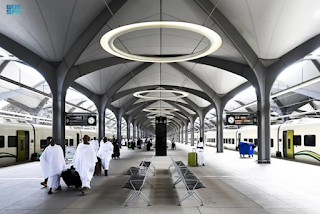2023 Hajj season
During a briefing at the Unified Security Operations Center in Makkah, Lt. Gen. Mohammed Al-Bassami, director of public security and chair of the Hajj Security Committee, said: “The general plan for the tasks and responsibilities of the Hajj security forces for this year, approved by the minister of interior and chairman of the Supreme Hajj Committee, Prince Abdulaziz bin Saud bin Naif, has focused on intensifying the field security presence in a way that ensures the speedy monitoring of all types of security cases and remarks, and rapid response with appropriate measures.” <.......>
Maj. Gen. Mohammed Al-Omari, commander of the Special Emergency Forces at the Presidency of State Security, said that its staff are ready to maintain security and order in Makkah, Madinah, and the holy sites, to protect guests of the Kingdom, prevent breaches of Hajj regulations, stop unauthorized individuals from entering the holy sites, manage the movement of crowds, and organize the throwing of pebbles at the Jamarat.
Maj. Gen. Hamoud Sulaiman Al-Faraj, director of the Civil Defense Forces, said preparations are complete for its activities at Al-Mashaer Operations Center, including managing volunteers and the Haram Support Forces, and coordinating with government agencies and the Hajj Emergency Operations Center in addressing any emergencies that arise, and with.
Maj. Gen. Saleh Al-Murabba, commander of Passports Forces for Umrah, said his department’s plans are complete and in place. He said 1,604,772 pilgrims have arrived from outside the Kingdom to perform Hajj rituals, including 238,708 under the Makkah Route initiative, which aims to make the Hajj experience as easy as possible.
II.
MAKKAH: The first batch of pilgrims have arrived from Jeddah and Madinah to Makkah via the fastest electric train in the Middle East to begin performing the annual Hajj pilgrimage in Saudi Arabia (Arab news)
The transport and logistics system provides its services through one of the longest trains in the world to the pilgrims of the Grand Mosque, to enhance integration and interdependence with all modes of transport, as the Haramain train services arrivals from the airport to transport them to Makkah, with a fleet of 15 trains and a capacity of 1.5 million seats.
Its speed reaches 300 kilometers per hour and its road network spans for 453 kilometers.
The Haramain express train is being operated by 35 electric trains, with a capacity of 417 passengers per train through 13 carriages divided into five business class compartments, in addition to catering services and eight economy class compartments, with a total of 113 business class seats and 304 economy class seats.



Comments